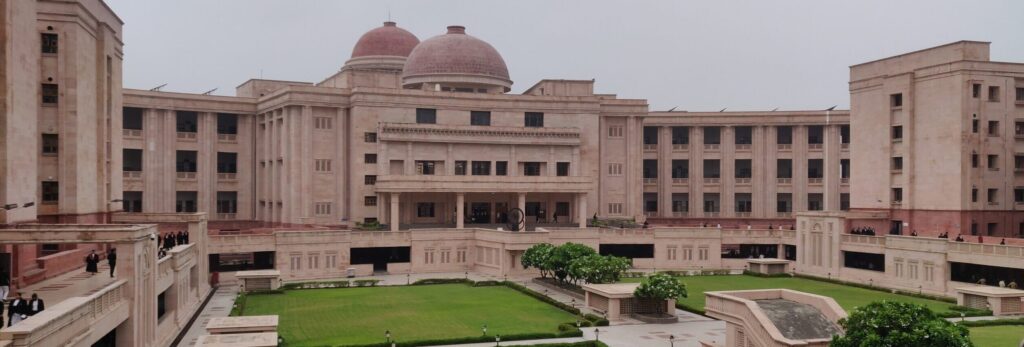
There is a massive pendency of cases in Indian courts from lower courts to the Supreme Court of India. As per the data of the National Judicial Data Grid (NJDG), around 93 Crore cases are pending in the lower courts. Around 49 Lacs cases before the High Courts and around 58,000 cases are also before the Supreme Court.
What is the Pendency of cases-
By pendency of cases, it is meant ‘those cases which have been filed and admitted by the court of Law but have not been decided yet.’ Whatever the reason may be whether it is budget or insufficiency of judges or be it on the part of parties or Advocates, it is not good for a healthy judicial system.
Data on Pendency of Cases –
National Judicial Data Grid (NJDG) is a flagship project implemented under the aegis of the e-Committee Supreme Court of India. It is a system for monitoring the pendency and disposal of cases. It is for the High Courts and the Subordinate Courts of India. NJDG provides a comprehensive database of the orders, judgments, and case details of District and Subordinate Courts and High Courts.
The statistics of pendency at the National, State, District and Individual Court levels can be accessed by anyone visiting the portal of the NJDG. It has come up as an information window regarding the pendency of cases that is accessible to everyone.
Alone, the Allahabad High Court (including Lucknow Bench), the biggest High Court in the Country has 10,30,770 pending cases. Other High Courts are not lagging. High Court of Andhra Pradesh (2,44,065), Delhi High Court (1,08,043), Kerala High Court (1,93,764), High Court of Orissa (1,47,071). The High Court of Sikkim which is having the least pendency of cases that is 168 cases.

Legislature’s view on pendency-
A news article was published on NDTV titled ‘Nearly 5 Crore Pending Cases in Courts, Over 69,000 in Supreme Court’. It talks about a reply by Mr. Kiren Rijiju the then Union Minister of Law and Justice, on December 31, 2022. Mr Minister had said that the total pending cases in district and subordinate courts were pegged at over 4.32 crore.
“There are 59,87,477 cases pending in high courts across the country. It is as per the information available on National Judicial Data Grid (NJDG) on February 1, 2023,” he said. Out of these, 10.30 lakh cases were pending in the Allahabad High Court – the biggest high court in the country. The Sikkim High Court has the least number of 171 cases.
Mr Kiren Rijiju has further stated that the Government has taken several initiatives to provide a “suitable environment” for the expeditious disposal of cases by the judiciary.
Reasons behind the Pendency of Cases-
The major reasons which are causing the pendency of cases are as follows:
- The Supreme Court’s role has changed drastically, instead of exercising its Original Jurisdiction it is exercising Appellate Jurisdiction, which was never meant for the Apex Court.
- The number of Judges in the Supreme Court has increased manifold from 1950 (seven judges) to 2023 (34 Judges), but the pendency was rising faster than the number of Judges.
- Poor Judges to population ratio is also one of the significant fundamental driving forces behind the pendency of cases. India has only 20 Judges per million population. The Law Commission had earlier recommended 50 Judges per million.
- The procedure allows a maximum of three adjournments per case but endless adjournments are going on there in most cases, leading to massive pendency of cases.
- The lack of budget is leading to poor infrastructure.
- In Lower Courts, when a Judge completes his monthly quota of orders then after he avoids passing orders.
- When any Judge is about to get transferred avoids passing any order or unnecessarily delays the proceedings.
- Generally, it is seen in the Lower Court that orders are kept pending by the Judges so that they can be passed on the day of Lok Adalat.
- Lack of clerical staff is also a major concern, many judges get steno only for 1 or 2 days a week to type orders.
- Advocates sometimes do not give listing applications for his case because the interim order was in his client’s favour.
- In many cases, it has been seen that parties have filed lawsuits under heat but do not attend the court on the date and ask their Advocate to seek adjournment.
- Police also delay investigation although the reason may be anything. Be it a lack of infrastructure, tools political pressure, public pressure or undue advantages which he received or wishes to receive.
Law Commission on Pendency-
The 18th Law Commission was constituted for three years from 1st September 2006. It was by an Order issued by the Government of India, Ministry of Law and Justice, Department of Legal Affairs, New Delhi. The report was submitted to the Union Minister of Law and Justice, Ministry of Law and Justice, Government of India by Dr. Justice A. R. Lakshmanan, Chairman, Law Commission of India, on the 5th August 2009. The Subject of the Report was ‘REFORMS IN THE JUDICIARY – SOME SUGGESTIONS‘.
Some of the recommendations of the Law Commission are as follows:
- The present strength of the judges should be increased manifold according to the pendency, present and probable.
- It is also necessary that the work of the High Courts is decentralized, that is, more Benches are established in all States. The Benches should be so established that a litigant is not required to travel long.
- Considering the huge pendency of cases at all levels of the judicial hierarchy, it has become necessary to increase the number of working days.
- There is no denying the fact that delay frustrates justice. In the present set-up it often takes 10 – 20 – 30 or even more years before a matter is finally decided. Speedy justice is the right of every litigating person.
- One Hon’ble Judge of Delhi High Court calculated that 464 years will be required to clear the arrears with the present strength of the judges in that High Court.
- The Law Commission of India is of the firm opinion that considering the alarming situation of the pendency of cases and the constitutional rights of a litigant for a speedy and fair trial, the Government of India should direct the State authorities to set up Fast Track Courts in the country, which alone, in the opinion of the Law Commission, will solve the perennial problem of pendency of cases.
Impact of Pendency of cases-
- It is well known legal maxim that Justice delayed is Justice denied. Speedy trial is a part of the Fundamental Right to life guaranteed by Article 21 of the Constitution of India.
- It affects social development badly, resulting in Lower Per Capita Income, Higher Poverty, and increased Crime Rate.
- It has a huge impact on Human Rights, overcrowding of the prisons which are already infrastructure deficient, in some cases beyond 150% of the capacity, results in a “violation of human rights”.
- It reduces faith in common people in the Judicial System of the country.
Way ahead-
- New Court Buildings need to be constructed and the States should provide suitable land for the construction of court buildings
- The strength of Judges should be increased so that the pendency can be tackled properly.
- Class III and Class IV employees should be recruited so that Judges could do their work properly.
- Lok Adalats should be organised regularly for the settlement of disputes.
- Establishment of more Gram Nyayalayas, to ensure justice at the grass root level and reduce the burden of District Courts.
- E-Filing of cases should also be introduced in lower courts.
Speedy, Accessible and Affordable justice is the need of the hour. It is a well-known and well-established maxim that Justice Delayed is Justice Denied. What would anyone do of justice if it was not on time? States and Courts have to ensure that everyone should get justice who seeks it.


